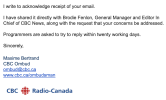MinIreland
Senior Member (Voting Rights)
I so feel you both, @Utsikt and @CovidiviciI feel your pain @Covidivici - I’m going through much of the same.
Found this when I googled her name. Sounds like she had a tough experience getting sick for roughly two years (well within the range of self-resolving post-viral fatigue), and I’m happy she’s doing better. Now she’s seemingly committed to spreading toxic positivity and a personal recovery journey narrative far and wide.
The blog was posted feb 2025.
She says’s she’s been feeling amazing for months, but it’s 11 months since she took the course. So she presumably «stopped» having LC when she took the course, but gradually recovered over maybe half a year.
The rest of the blog reads like something out of Paul Garner’s personal notes of «evidence» for brain retraining. This seems to be the depth of her critical reasoning around the whole thing:
[Edited because I hit Reply accidentally].
A friend of mine told me this weekend that, if I would believe in my doctor and think positively, I would recover. "That's how it works", he said. I told him that that's not how it works and explained why his comment is hurtful (after all, people like my friend are basically saying: If you don't recover, it's your own fault). He then went on to explain why it is his belief that if you believe something strongly enough, it will happen. This was my reply:
**
I don't like that belief, because, as I said, if people don't recover, it sounds like it's their own fault for 'not believing' or 'not being hopeful enough'.
Yes, I know these stories as well, and although I'm of course very happy for these people, I think it's very damaging to those less lucky, to claim that is because of 'their spirit'. You hear it often as well when people recover from cancer "(s)he was so strong and positive, (s)he fought for recovery". As if the people who die from it are not strong and haven't fought! So, that's the other side of the coin.
**
It's so hard to not to just tell people to fuck off and stay friendly!




